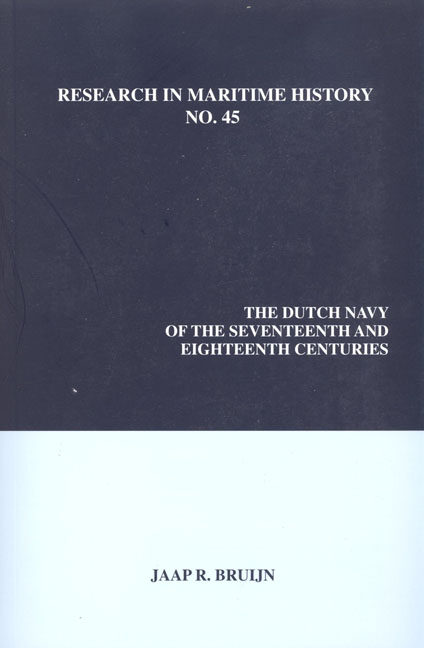Book contents
- Frontmatter
- Contents
- Illustrations
- Tables
- Series Editor's Foreword
- About the Author
- Introduction to the 2011 Edition
- Foreword
- Preface
- Introduction
- Map of the Dutch Republic
- Map of Dutch Naval Activity in European Waters
- Part One The “Old” Navy, Late 1500s-1652
- Naval Operations against Spain and the Dunkirk Privateers
- The Boards of the Admiralties at Work
- The Slow Birth of a Naval Officers' Corps
- Truly International Crews
- Part Two The “New” Navy, 1652-1713
- Part Three A Second-Rate Navy, 1714-1795
- In Retrospect
- Bibliography
- Index
The Boards of the Admiralties at Work
from Part One - The “Old” Navy, Late 1500s-1652
- Frontmatter
- Contents
- Illustrations
- Tables
- Series Editor's Foreword
- About the Author
- Introduction to the 2011 Edition
- Foreword
- Preface
- Introduction
- Map of the Dutch Republic
- Map of Dutch Naval Activity in European Waters
- Part One The “Old” Navy, Late 1500s-1652
- Naval Operations against Spain and the Dunkirk Privateers
- The Boards of the Admiralties at Work
- The Slow Birth of a Naval Officers' Corps
- Truly International Crews
- Part Two The “New” Navy, 1652-1713
- Part Three A Second-Rate Navy, 1714-1795
- In Retrospect
- Bibliography
- Index
Summary
About fifty councillors comprised the boards of the five admiralties. They represented all seven provinces of the Republic and were supposed to operate collectively in the governing of an admiralty. For them to carry out this latter regulation, their continuous attendance at the meetings would have been required, and it was something that rarely happened. Councillors from the inland provinces tended to be absent more often than their colleagues from the maritime provinces. Severe weather conditions prevented some from travelling long distances to attend meetings, and the lack of good fellowship among the councillors could have had the same effect on attendance levels. Another reason for not attending could have been that councillors were commissioned elsewhere on behalf of the admiralty.
Minutes, which were always taken at these meetings, are the historian's most valuable source of information on the councillors’ activities. Among the most complete minutes which have survived are those of the meetings at Rotterdam, for example, in 1625. The councillors met in the Prinsenhof almost daily, even on Sundays. On one Sunday, 15 June, the councillors met twice, first at 7 AM, then again after church at 11 AM. Five members were present. The States General and Prince Frederick Henry wanted the board to speed up the equipping of some men-of-war and the nomination of its captains. Such demands could force a board to meet daily for weeks in a row - a fact which suggests that a councillorship was certainly no sinecure. Only rarely did fewer than three members appear, but full boards are also mentioned in the minutes. Decisions carried by a majority of votes were rare exceptions, but this did not mean that all other decisions were taken unanimously. The few abstainers or dissenters were simply not recorded. It is interesting, however, that on 18 January 1625, the secretary noted with obvious satisfaction that the whole board had decided to cease entertaining themselves at inns and the Prinsenhof at admiralty cost.
The agenda always contained a great variety of topics, often ten or more, as a consequence of the many-sided tasks with which admiralties had been burdened. Foremost were the matters resulting from the collection, administration and adjudication of the fiscal duties and from the land warfare, with its constantly shifting battle lines. Agendas therefore dealt with a variety of problems. A cargo of sugar boxes was confiscated in Delfshaven.
- Type
- Chapter
- Information
- Publisher: Liverpool University PressPrint publication year: 2011

